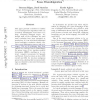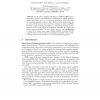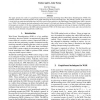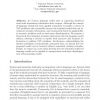366 search results - page 17 / 74 » Subjectivity Word Sense Disambiguation |
ACL
1997
13 years 9 months ago
1997
This paper presents a method to combine a set of unsupervised algorithms that can accurately disambiguate word senses in a large, completely untagged corpus. Although most of the ...
CORR
2000
Springer
13 years 7 months ago
2000
Springer
In this paper Schapire and Singer's AdaBoost.MH boosting algorithm is applied to the Word Sense Disambiguation (WSD) problem. Initial experiments on a set of 15 selected polys...
LREC
2008
13 years 9 months ago
2008
This paper presents the results of a graph-based method for performing knowledge-based Word Sense Disambiguation (WSD). The technique exploits the structural properties of the gra...
CICLING
2008
Springer
13 years 9 months ago
2008
Springer
An N-gram language model aims at capturing statistical word order dependency information from corpora. Although the concept of language models has been applied extensively to handl...
COLING
2002
13 years 7 months ago
2002
In this paper, a supervised learning system of word sense disambiguation is presented. It is based on conditional maximum entropy models. This system acquires the linguistic knowl...




